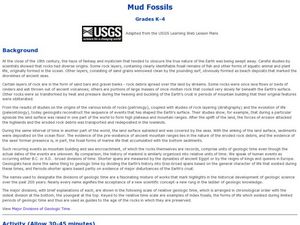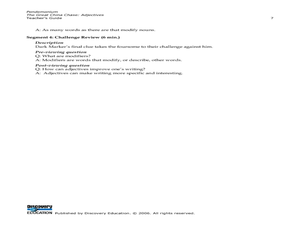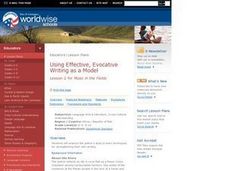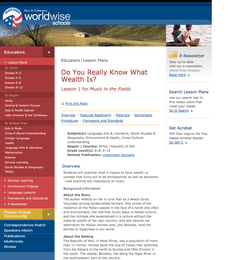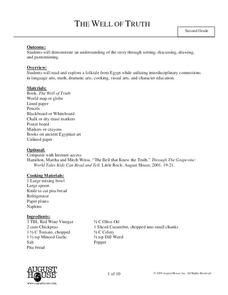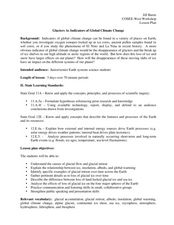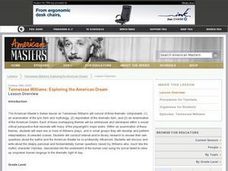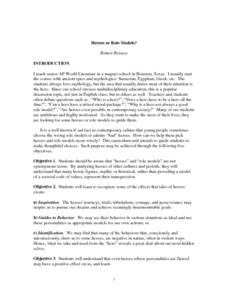Curated OER
Undercurrents Of Currency
Students investigate the currencies used by different countries, and explore the principles of currency trading by exchanging currencies at current market rates. They, in groups, access websites which give them current rates.
Curated OER
Rockin? Chalk (Integrating science - make own chalk)
Students use plaster of Paris, talc, and cornstarch to create their own chalk. They hypothesize what mixture of ingredients produce the "best" chalk. Students discuss what they think are the characteristics of the "best" chalk.
Curated OER
Mud Fossils
Young scholars observe real fossils. In this science lesson, students make their own mud fossils by pressing material into the mud and letting it dry in the sun for 3-4 days. Young scholars then get the fossils out displaying their mud...
Curated OER
Cloudy Days are for Reading and Writing
Students research weather proverbs and determine the scientific validity of 3 weather proverbs. They write an essay presenting their reasoning. They interview elderly people to graph the most frequently heard proverbs and theorize...
Curated OER
Did Rome Fall, Or Was It Pushed?
Seventh graders work in teams to research the reasons for the fall of Rome and come to a conclusion of why it did.
Curated OER
Engineering: Simple Machines
Fourth graders participate in activities to examine how simple machines help build things. They identify the six types of simple machines. They discover how simple machines where use historically to build pyramids and how they are still...
Curated OER
The Great China Chase: Adjectives
Stories are created, by students, using a variety of adjectives. 3-5th graders will learn about adjectives and use their new knowledge to create ad-lib stories to share with the class demonstrating their mastery of adjectives, indefinite...
Curated OER
Astronomy Merit Badge
Young scholars explore astronomy through the Starry Night Constellation Adventure software. They print star charts and identify constellations. They sketch the Big Dipper and describe the Milky Way. They list the five most visible...
Curated OER
Using Effective, Evocative Writing as a Model
Students analyze the author's style to learn techniques for strengthening their own writing. They re-read "Music in the Fields" and highlight images that create vivid pictures in their minds-places where Young "shows, not tells" and...
Curated OER
Come On Over To Maya Place
Fifth graders analyze the Mayan culture. In this Mayan culture lesson, 5th graders study the Mayan culture noting similarities and differences between the Mayan culture and their own. Students examine hieroglyphic writing and the Mayan...
Curated OER
Medicine, Technology and Society
Students compare and contrast traditional Chinese and contemporary Western approaches to medicine. They bring a rational and scientific approach to the evaluation of alternative medicines. They study acupuncture from a Chinese and...
Curated OER
Literature: Isabel Allende
Students watch and respond to a Bill Moyers Now video on the Chilean author, Isabel Allende. They brainstorm a list of recent events that might inspire writers and choose one to write about in poetic, diary, or short story form.
Curated OER
Let's Go To Mexico
Learners are able to use the Internet to conduct research. They research Mexican culture and traditions. Students compare and contrast Mexican and U.S. food and clothing. They convert United States currency to Mexican pesos. Learners...
Curated OER
Do You Really Know What Wealth Is?
Young scholars examine what it means to have wealth-a concept that turns out to be philosophical as well as economic-and examine the importance of music. They examine the concepts of wealth in Mali and in the United States and consider...
Curated OER
The United States Flag
Students discover the meaning and symbolism behind the American flag. In this activity on National symbols, students design a flag for their school, explain the symbolism they used, and distinguish the elements that constitute the US...
Curated OER
The Well of Truth
Second graders explore the Egyptian folktale, The Well of Truth. In this folktale lesson, 2nd graders read the tale and discuss the events from the text. Students write a diary entry from the point of view of a character in the text....
Curated OER
Pleistocene Mammals
Students research the causes of the extinction of Pleistocene mammals. In this Pleistocene mammals lesson, students read essays to understand the Pleistocene epoch. Students write an essay about the personal impact of this epoch.
Curated OER
Glaciers As Indicators of Global Climate Change
Students research about glacial ice melting on the four major spheres of the Earth. In this earth science lesson, students explain how this process relates to global warming. They create a presentation and share their findings with the...
Curated OER
The Trail of Tears; Its Grief and Loss
Fifth graders trace the development and expansion of the US while studying the Trail of Tears. They examine the political factors and analyze the impact the Indian Removal Act had upon a society. They present a case for or against the...
Curated OER
Powerful Pulleys
Students explore the building of a pyramid and how pulleys were used to change the direction of applied force. They demonstrate the mechanical advantage of using a pulley and apply it to modern engineering.
Curated OER
Poet Naomi Shihab Nye
Students read and analyze poetry by Naomi Shihab Nye. They define stereotypes, view and discuss a video interview with Nye, present an oral reading of a poem, and write a persuasive letter to an author.
Curated OER
Tennessee Williams: Exploring the American Dream
Young scholars read and analyze selections of Tennessee Williams' work. They write journal responses, conduct Internet research, perform various scenes from one of Williams' dramas, and create a presentation.
Curated OER
Navigating by the Numbers
Students observe how math is important in navigation and engineering. They study how surveyors use math and science to calcute, count, measure, label, and indicate distances on a map. They estimate specific distances.
Curated OER
Heroes Or Role Models?
Students recognize that "heroes" and "role models" are not synonymous terms. By analyzing heroes of other cultures and periods, they determine that many heroic figures, mythic or historical, rather than providing a model of a societal...




